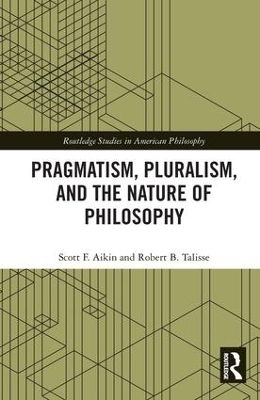
Pragmatism, Pluralism, and the Nature of Philosophy
Routledge (Verlag)
978-0-415-79355-1 (ISBN)
For the past fifteen years, Aikin and Talisse have been working collaboratively on a new vision of American pragmatism, one which sees pragmatism as a living and developing philosophical idiom that originates in the work of the "classical" pragmatisms of Charles Peirce, William James, and John Dewey, uninterruptedly develops through the later 20th Century pragmatists (C. I. Lewis, Wilfrid Sellars, Nelson Goodman, W. V. O. Quine), and continues through the present day. According to Aikin and Talisse, pragmatism is fundamentally a metaphilosophical proposal – a methodological suggestion for carrying inquiry forward amidst ongoing deep disagreement over the aims, limitations, and possibilities of philosophy. This conception of pragmatism not only runs contrary to the dominant self-understanding among cotemporary philosophers who identify with the classical pragmatists, it also holds important implications for pragmatist philosophy. In particular, Aikin and Talisse show that their version of pragmatism involves distinctive claims about epistemic justification, moral disagreement, democratic citizenship, and the conduct of inquiry. The chapters combine detailed engagements with the history and development of pragmatism with original argumentation aimed at a philosophical audience beyond pragmatism.
Scott F. Aikin is Assistant Professor of Philosophy and Director of Undergraduate Studies in Philosophy at Vanderbilt University. He works primarily on pragmatism, epistemology, and argumentation theory. He has written more than fifty scholarly essays, and he has authored two books: Epistemology and the Regress Problem (2011) and Evidentialism and the Will to Believe (2014). Robert B. Talisse is W. Alton Jones Professor of Philosophy, Professor of Political Science, and Department Chair of the Philosophy Department at Vanderbilt University. His research focuses on pragmatism and contemporary political philosophy. He is the author of more than 100 scholarly articles, and several books, including Democracy and Moral Conflict (2009) and Engaging Political Philosophy (2016).
Foreword by Cheryl Misak. 1. Introduction: The Problems of Pragmatist Philosophers. Part I. Encounters with the Classical Idiom 2. Peirce’s Mixed Theory of Epistemic Justification. 3. Fixing Belief as Epistemic Conduct. 4. Clifford’s Pragmatism and the Will to Believe. 5. James’s Moral Philosophy. 6. What is Living and What is Dead in Deweyan Political Theory. Part II. Pragmatism and Metaphilosophy 7. Against Triumphalism: Defending Analytic Pragmatism. 8. Metaphilosophical Creep. 9. Pragmatist Metaphilosophy and Skepticism. Part III. Pragmatist Proposals 10. Can Pragmatist be Pluralists? 11. The Ethics of Inquiry 12. Global Expressivism: Is it Still Cool? 13. On a Certain Blindness in Pragmatist Political Philosophy. 14. Public Argument in a Free Society. 15. Epilogue: Pragmatism as Minimalist Metaphilosophy
| Erscheinungsdatum | 30.11.2017 |
|---|---|
| Reihe/Serie | Routledge Studies in American Philosophy |
| Verlagsort | London |
| Sprache | englisch |
| Maße | 152 x 229 mm |
| Gewicht | 498 g |
| Themenwelt | Geisteswissenschaften ► Philosophie ► Erkenntnistheorie / Wissenschaftstheorie |
| Geisteswissenschaften ► Philosophie ► Ethik | |
| Geisteswissenschaften ► Philosophie ► Philosophie der Neuzeit | |
| Sozialwissenschaften ► Politik / Verwaltung | |
| ISBN-10 | 0-415-79355-6 / 0415793556 |
| ISBN-13 | 978-0-415-79355-1 / 9780415793551 |
| Zustand | Neuware |
| Haben Sie eine Frage zum Produkt? |
aus dem Bereich

![Was heißt Denken?. Vorlesung Wintersemester 1951/52. [Was bedeutet das alles?] - Martin Heidegger](/media/113619842)
